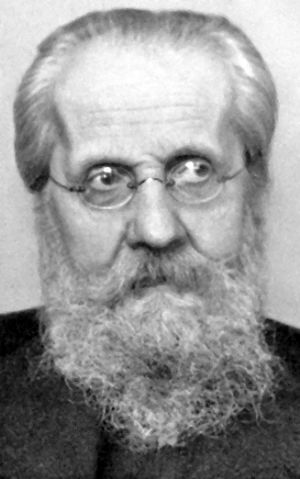Heinrich Rickert facts for kids
Quick facts for kids
Heinrich Rickert
|
|
|---|---|
 |
|
| Born |
Heinrich John Rickert
25 May 1863 |
| Died | 25 July 1936 (aged 73) |
| Nationality | German |
| Education | University of Berlin University of Strasbourg (PhD, 1888) |
| Era | 19th-century philosophy |
| Region | Western philosophy |
| School | Neo-Kantianism (Baden school) |
| Institutions | University of Freiburg (1894–1915) Heidelberg (1915–1932) |
| Thesis | Zur Lehre von der Definition (On the Theory of Definition) (1888) |
| Doctoral advisor | Wilhelm Windelband |
| Doctoral students | Bruno Bauch Martin Heidegger |
| Other notable students | Rudolf Carnap |
|
Main interests
|
Epistemology |
|
Notable ideas
|
Qualitative distinction held to be made between historical and scientific facts Distinction between knowing (kennen) and cognizing (erkennen) |
|
Influences
|
|
|
Influenced
|
|
Heinrich John Rickert (German: [ˈʁɪkɐt]; May 25, 1863 – July 25, 1936) was an important German philosopher. He was one of the main thinkers in a group called the Neo-Kantians.
Contents
About Heinrich Rickert
Heinrich John Rickert was born on May 25, 1863, in Danzig. At that time, Danzig was part of Prussia (today it's Gdańsk, Poland). His father, Heinrich Edwin Rickert, was a journalist and later a politician.
Rickert became a professor of philosophy. He taught at the University of Freiburg from 1894 to 1915. After that, he moved to the University of Heidelberg, where he taught from 1915 until 1932.
He passed away in Heidelberg, Germany, on July 25, 1936.
Rickert's Ideas in Philosophy
Heinrich Rickert is known for his ideas about how we understand facts. He believed there was a special difference between facts in history and facts in science.
History and Science
Rickert thought that history and science look at things in different ways.
- Science tries to find general rules that apply everywhere, like the laws of physics.
- History focuses on unique events and specific people. It looks at things that happened only once.
He argued that understanding history is different from understanding science.
Values and Life
Rickert also had strong ideas about values. Values are things we believe are important, like honesty or kindness. He felt that true values should be seen from a distance. This means they shouldn't be mixed up with our everyday feelings or desires.
He disagreed with some other philosophers who thought that "vital values" (values based on life's experiences) were true values. Rickert believed that real values needed a more thoughtful, separate approach.
Influence on Other Thinkers
Rickert's ideas were very important to other famous thinkers.
- Max Weber: A well-known sociologist (someone who studies society). Weber used many of Rickert's methods. For example, Weber's idea of the "ideal type" came from Rickert's work. An ideal type is like a perfect example or model that helps us understand things, even if it doesn't exist perfectly in real life.
- Martin Heidegger: Another famous philosopher. Heidegger started his career as Rickert's assistant. He also completed his advanced research paper (called a habilitation thesis) under Rickert's guidance.
The Baden School
Rickert, along with another philosopher named Wilhelm Windelband, led a group of thinkers called the Baden school of Neo-Kantianism. This school focused on how we form concepts and how we understand different types of knowledge, especially in history and culture. They built on the ideas of Immanuel Kant, an even older and very famous philosopher.
Key Works by Heinrich Rickert
Rickert wrote many books and papers about his philosophical ideas. Here are a few of his important works:
- Zur Lehre von der Definition (On the Theory of Definition) (1888): This was his doctoral thesis, which is a big research paper you write to get a PhD.
- Die Grenzen der naturwissenschaftlichen Begriffsbildung (The Limits of Concept Formation in Natural Science) (1896–1902): In this book, he explored how scientific ideas are formed and what their boundaries are.
- Kulturwissenschaft und Naturwissenschaft (Science and History) (1899): This work looked at the differences between natural sciences and cultural sciences (like history).
See also
 In Spanish: Heinrich Rickert para niños
In Spanish: Heinrich Rickert para niños
 | William L. Dawson |
 | W. E. B. Du Bois |
 | Harry Belafonte |

